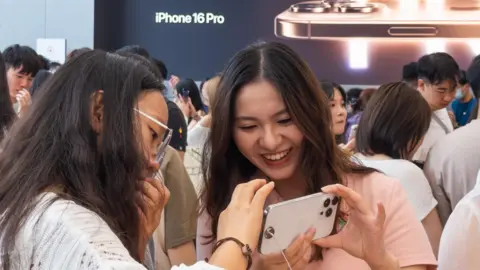
 Getty Images
Getty ImagesShoppers in China are getting rare discounts on iPhones, as Apple faces increasing competition from local brands.
The four-day promotion, which starts on Saturday (January 4), includes discounts of up to 500 yuan ($68.50, £55.30) on some of the US tech giant's latest mobile phones.
Chinese phone maker Huawei also reduced the prices of its advanced mobile devices by up to 20%.
The cuts come as consumers in China remain hesitant about spending due to the economic challenges the country faces.
The offer covers top Apple models as well as older phones and some other devices.
The largest discount of 500 yuan will apply to Apple's flagship iPhone 16 Pro, which starts at 7,999 yuan, and the iPhone 16 Pro Max, which currently costs 9,999 yuan.
The company held a similar promotional campaign in China last year before the Lunar New Year holiday. This year, the festival begins at the end of January.
Behavior change
“Apple's strategy has changed to adapt to the change in Chinese consumers' shopping behavior,” said Will Wong, senior research director at market intelligence firm International Data Corporation (IDC).
“The value-seeking trend has made price cuts more attractive to consumers. Apple may fall behind other competitors if it does not adopt this pricing strategy.”
The discounts offered by Apple and Huawei reflect a broader trend in China.
From online retail giants to the country's carmakers, deals are being offered in a bid to attract customers who have been reluctant to spend as the world's second-largest economy slows.
Against this backdrop, Apple's Chinese market share has come under increasing pressure from local competitors, such as Vivo and Xiaomi.
Local competition
The American company returned to the list of the five largest smartphone manufacturers in China in the third quarter of 2024 after leaving the list for a short period.
According to IDC's latest research, Vivo was the best-selling smartphone manufacturer in China in this period as its sales jumped by more than 20%.
During the same period, Apple saw sales decline by 0.3%. Huawei shares jumped more than 40%.
“We have seen increased competition in the market with almost everyone launching a flagship phone in the last quarter,” said Evan Lam, a senior analyst at Counterpoint Research.
Huawei witnessed a rise in demand for its products after its return to the premium smartphone market in August last year.
The Shenzhen-based company has since launched several new devices powered by advanced technology even though the company is facing US restrictions.





